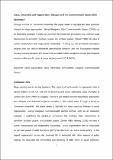Class, citizenship and regeneration : Glasgow and the Commonwealth Games 2014
Abstract
Through a focus on “consumer-citizenship” this paper foregrounds the class practices inherent in urban regeneration. Using Glasgow's 2014 Commonwealth Games (CWGs) as an illustrative example of regeneration, it seeks to highlight the market-led processes that underpin state interventions. The paper demonstrates how these processes are implemented to transform “problem people, and problem places” (Damer 1989, From Moorepark to “Wine Alley”) into sites of “active” consumption and “responsible” citizenship. Yet, access to this “consumer citizenship” is stratified. In doing so, we synthesise conceptual insights from the Marxist-influenced gentrification literature and the Foucauldian-inspired housing renewal literature. We forward this to initiate further academic debate and empirical enquiry on the specific issue of mega sporting events.
Citation
Paton , K , Mooney , G & McKee , K 2012 , ' Class, citizenship and regeneration : Glasgow and the Commonwealth Games 2014 ' , Antipode , vol. 44 , no. 4 , pp. 1470-1489 . https://doi.org/10.1111/j.1467-8330.2011.00966.x
Publication
Antipode
Status
Peer reviewed
ISSN
0066-4812Type
Journal article
Collections
Items in the St Andrews Research Repository are protected by copyright, with all rights reserved, unless otherwise indicated.

